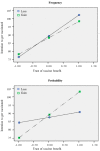The Individuals' Willingness to Get the Vaccine for COVID-19 during the Third Wave: A Study on Trust in Mainstream Information Sources, Attitudes and Framing Effect
- PMID: 36285969
- PMCID: PMC9598333
- DOI: 10.3390/bs12100399
The Individuals' Willingness to Get the Vaccine for COVID-19 during the Third Wave: A Study on Trust in Mainstream Information Sources, Attitudes and Framing Effect
Abstract
Different inner and external determinants might explain an individual's willingness to get the vaccine for COVID-19. The current study aims at evaluating the effects of trust in mainstream information sources on individuals' willingness to get the vaccine and the moderator role of the message framing. Six hundred and thirty-four participants (68.5% females and 31.5% males) were enrolled in an online survey. Participants filled out a questionnaire assessing: trust in mainstream information sources and vaccinal attitude (trust in vaccine benefit, worries over unforeseen future effects, concerns about commercial profiteering, and preference for natural immunity). In addition, participants were randomly exposed to one of four conditions of framing information about the vaccine (gain-probability; gain-frequency; loss-probability; loss-frequency). Results showed that trust in vaccine benefit (b = 9.90; 95% CI: 8.97, 11.73) and concerns about commercial profiteering (b = -4.70; 95% CI: -6.58, -2.81) had a significant effect on the intention to get the vaccine. Further, a significant interaction was observed between loss-gain and trust in vaccine benefit and between frequency-probability and concerns about commercial profiteering. Future vaccination campaigns should consider the individuals' concerns about vaccine benefit and economic profits to efficaciously deliver frequency-framed or probability-framed information.
Keywords: COVID-19; attitudes; decision-making; framing effect; trust; vaccine intention.
Conflict of interest statement
The authors declare no conflict of interest.




